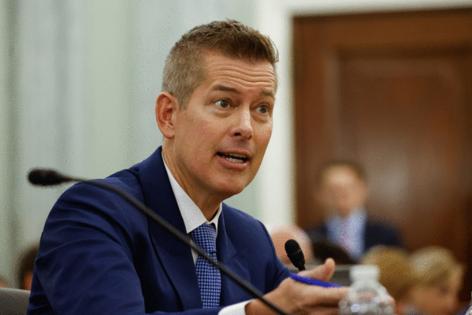GOP lawmakers seek details of air traffic revamp before giving more funding
Published in Political News
WASHINGTON — Republican lawmakers say they want Transportation Secretary Sean Duffy to deliver more details about his $30 billion-plus plan to modernize the nation’s air traffic control system before they will provide another funding tranche for the project.
Duffy’s plan appears to have bipartisan support, but a handful of Republicans said in interviews last week that the Federal Aviation Administration’s decadeslong struggle to implement its NextGen overhaul of aviation navigation, a similar multibillion-dollar undertaking to transform air traffic control, is driving apprehension about immediately providing more cash for such an overhaul.
“It’s comedic to watch how this federal government goes through money on someone’s latest, greatest idea, and then it’s obsolete before you can ever end up spending money to sustain your legacy systems,” said House Transportation-HUD Appropriations Chairman Steve Womack, R-Ark. “We need to see the plan. We need to see what the milestones are and what the benchmarks for funding are going to need to be as we build this thing out. And we ought to be able to do this in less than five years.”
President Donald Trump and Duffy have promised sweeping overhauls since the January midair collision between an American Airlines flight and an Army Blackhawk helicopter at Ronald Reagan Washington National Airport that left 67 people dead, in addition to other aviation mishaps and outages of air traffic control systems.
Womack, House Transportation Aviation Subcommittee Chairman Troy Nehls, R-Texas, and Senate Commerce Aviation Subcommittee Chairman Jerry Moran, R-Kan., said they intend to perform rigorous oversight of any congressional funding to avoid another decadeslong delay.
“It’s not just safe skies, but I’m also talking about the kind of technology that allows us to be able to be better, more responsible and efficient in directing air traffic,” Womack said. “It is very important to the most developed country on the planet. We should have the very best.”
The reconciliation law provided an initial $12.5 billion for the project. Duffy called that a “down payment to implement our state-of-the-art design.” But he told lawmakers in July that the complete overhaul would cost roughly $31.5 billion, and in a July Cabinet meeting he called on lawmakers to quickly secure additional funding.
Duffy released a framework in May that details initiatives to transition to updated telecommunications networks, upgrade radio equipment, replace radar systems and address the air traffic control facilities backlog.
The framework lays out a process to hire one private contractor to manage the overhaul, reflecting Duffy’s view that the FAA is “not qualified to manage this kind of a project.”
He also committed to completing the upgrades over the next three or four years but added that finding a contractor could take around 16 to 18 months. The FAA is currently asking for proposals from contractors.
“This is really old stuff. We will need more to do it,” Duffy said in a July hearing about the equipment. “No offense to anybody, but the way Congress spends money, we’re talking $31.5 billion to do the full project. And my hope is that we’ll have an additional conversation about how we can do that — and time is of the essence.”
Funding fatigue
Many Republicans have lauded Duffy’s decision to use one company to manage the project. They agree that the FAA may not be equipped to handle such a large undertaking. But they said they need more assurances that the project won’t become NextGen 2.0.
The FAA released its initial plan for NextGen in 2004. The agency said in 2023 that it expected to complete it by this year. But the final project won’t be done until at least 2030, the agency now says.
The Government Accountability Office reported in 2023 that the FAA had spent more than $14 billion on NextGen from fiscal years 2007 through 2022, and the GAO projected in 2018 that NextGen would cost the federal government and industry at least $35 billion through 2030.
Although the FAA reported in 2024 that NextGen had delivered $12.3 billion worth of total benefits to the aviation industry between 2010 and 2024, the project’s chronic delays and ballooning costs have given lawmakers what one source likened to “NextGen PTSD.”
“You know, it’s been 30 years or so since NextGen has been around. … It’s gone nowhere. It just seems like the FAA can’t get out of its way,” former House Transportation and Infrastructure Chairman Bill Shuster, R-Pa., said in an interview. “NextGen has really done not much of anything to improve the system.”
Shuster, now a senior policy adviser at law firm Squire Patton Boggs, said a plan with benchmarks could allow FAA to “unlock” certain amounts of federal funding once it completes certain project goals.
“I think that’s what it would take: a more detailed plan,” said Moran. “And I would put the onus on FAA for that. … We ought not just accept what the administration, any administration, says we ought to do for our work as Congress.”
Nehls added that the FAA’s handling of the $12.5 billion provided in reconciliation will also inform future appropriations for the project.
“Let’s just make sure that when we start rolling out some of the project … that money is spent wisely, and let’s show Congress that there’s a change in culture and a change in attitude,” Nehls said. “Whatever the number is, you’ve got to show that the money that we’re spending, that reconciliation funding, is spent wisely.”
All three lawmakers agreed, however, that once Duffy delivers a suitable plan, Congress will provide the funding.
“Is it going to require billions more? It most likely will, but we should support it, because it’s the right thing to do for the American people,” said Nehls.
“Jan. 29 keeps reminding us that we can’t put this off,” Moran said.
©2025 CQ-Roll Call, Inc., All Rights Reserved. Visit cqrollcall.com. Distributed by Tribune Content Agency, LLC.
























































Comments